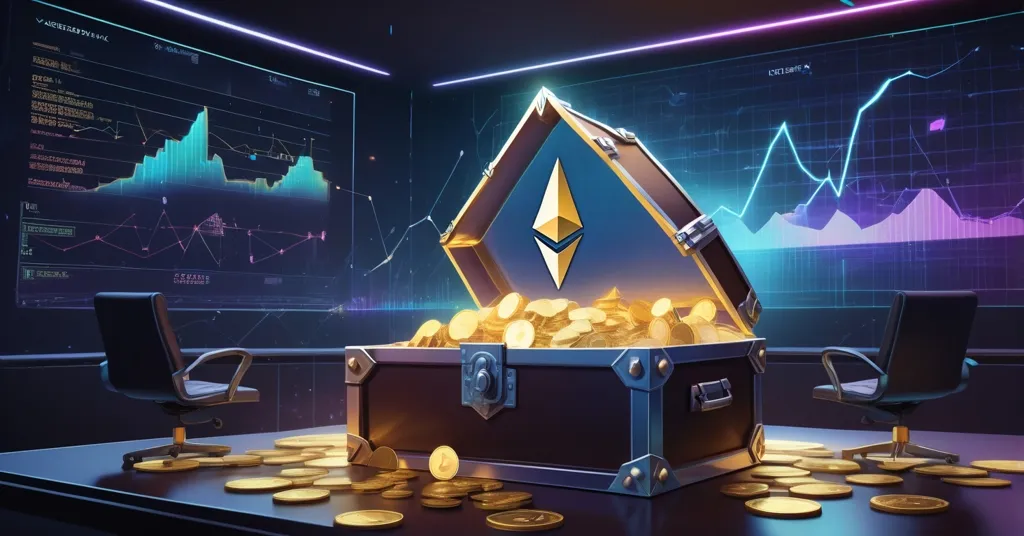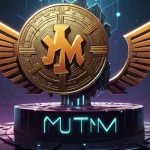GameSquare Bets $5M on Ethereum: A Risky DeFi Treasury Strategy Unveiled

GameSquare’s $5 Million Ethereum Dive: A High-Stakes DeFi Treasury Play
GameSquare Holdings, a Nasdaq-listed software company out of Texas, has made waves with a $5 million investment in Ethereum (ETH), kicking off a bold $100 million treasury strategy. This isn’t just another corporate flirtation with cryptocurrency—it’s a calculated bet on decentralized finance (DeFi) to deliver yields that could dwarf traditional staking returns, setting a new precedent in blockchain finance.
- Opening Move: $5 million for 1,818.84 ETH at an average price of $2,749.
- Grand Plan: A $100 million ETH treasury strategy targeting 8-14% yields via DeFi.
- Market Pulse: ETH up 7.4% to $2,993 recently, though still 40% below its $4,878 peak.
Why Ethereum? A Shift from Bitcoin’s Playbook
Corporate treasuries embracing crypto isn’t a fresh headline. Since 2020, heavyweights like MicroStrategy and Tesla have parked billions in Bitcoin (BTC), treating it as digital gold—a hedge against inflation and a store of value. MicroStrategy alone holds over $14.5 billion in BTC as of mid-2024, banking on its battle-tested resilience and relatively lower volatility. Bitcoin’s simplicity is its charm: buy, hold, and hope the price moons. But GameSquare is playing a different game. They’re tapping into Ethereum’s unique edge—its sprawling DeFi ecosystem, a network of protocols like Aave for lending, Compound for borrowing, and Uniswap for trading. These tools let users generate yields in ways Bitcoin can’t touch, and GameSquare is aiming for risk-adjusted returns of 8-14%, leagues above the 3-4% from basic ETH staking.
Bitcoin maximalists might scoff at this detour. Why mess with Ethereum’s wild price swings and DeFi’s untested waters when BTC offers a cleaner, safer bet? It’s a fair jab. Bitcoin’s regulatory status is clearer in most places, its volatility less stomach-churning than ETH’s, and its track record as a corporate safe haven is unmatched—something Ethereum can’t yet claim. GameSquare’s pivot feels like overcomplicating a winning formula. Yet, as champions of decentralization, we can’t ignore Ethereum’s niche. BTC is the king of value storage, but ETH powers programmable finance and active yield generation. It’s a different beast for a different fight, and GameSquare is betting it can tame it. For a deeper look at how these two giants stack up, check out this comparison of Bitcoin and Ethereum strategies.
DeFi: High Reward, High Risk
For those new to the game, DeFi—short for decentralized finance—refers to financial systems built on blockchains like Ethereum. No banks, no brokers, just smart contracts (self-executing code) running the show for loans, trades, and more. It’s disruptive, offering yields and access traditional finance can’t match. But it’s also the Wild West. Smart contract bugs have led to catastrophic hacks—think the $600 million Poly Network exploit in 2021. Then there’s impermanent loss, a sneaky risk when providing liquidity to DeFi trading pools, where price fluctuations can leave you worse off than if you’d just held your assets. And don’t forget Maximal Extractable Value (MEV) attacks, where miners or bots reorder transactions to siphon extra profits at users’ expense. DeFi’s a goldmine—until a glitch turns your treasury into a cautionary tale. Curious about potential pitfalls? Explore some risks of corporate DeFi investments.
GameSquare isn’t blind to this. They’ve teamed up with Dialectic, leveraging their Medici platform for DeFi yield optimization to navigate these choppy waters. As CEO Justin Kenna put it:
“In partnership with Dialectic and Ryan Zurrer, we are leveraging Medici, Dialectic’s proprietary platform that combines machine learning, automated optimization, and multi-layered risk controls, to target best-in-class risk-adjusted yields of 8-14%, well above current staking benchmarks of 3-4%.”
Medici isn’t just tech jargon. It uses machine learning to scan thousands of DeFi pools in real-time, hunting for the safest high-yield plays. It supports cross-chain arbitrage—profiting from price differences across blockchains—and auto-compounds rewards to maximize gains. Plus, it’s got defenses against MEV attacks, aiming to shield funds from on-chain predators. It’s a high-tech fortress for a high-risk gamble. But let’s be real: no system is bulletproof in DeFi’s unpredictable arena. Even with Medici, GameSquare is walking a tightrope over a pit of potential hacks, bugs, and market crashes.
Market Timing and Whale Moves
The timing of this $5 million bet isn’t arbitrary. Ethereum’s market is finally waking up after a long slumber. Though trading 40% below its November 2021 high of $4,878, ETH recently spiked 7.4% in 24 hours to $2,993, showing flickers of bullish momentum. Big players, known as “whales” (wallets holding 10,000 to 100,000 ETH), added roughly 200,000 ETH to their stashes earlier this month, a sign of confidence from the so-called smart money. On top of that, Ethereum-based spot ETFs have seen nine straight weeks of positive inflows as of early July, per SoSoValue data on ETH ETF trends, reflecting growing institutional appetite. GameSquare isn’t boarding a sinking ship—they’re catching a wave of renewed optimism, possibly seeing ETH’s current undervaluation as a buying opportunity.
But history whispers caution. Ethereum-focused treasury strategies have a spotty track record. Unlike Bitcoin’s straightforward “buy and hold” appeal, DeFi’s experimental nature and ETH’s price volatility have burned players before. Look at the broader DeFi space—projects tied to Ethereum, like Terra/Luna’s collapse in 2022, wiped out billions and shook confidence in yield-driven plays. GameSquare’s lofty 8-14% target sounds enticing, but past failures remind us that high rewards often mask higher risks. For more details on their approach, see the full breakdown of GameSquare’s Ethereum treasury play.
Regulatory Shadows Loom Large
Then there’s the regulatory elephant stomping through the room. In the U.S., the SEC’s flip-flopping on Ethereum’s status—security or commodity?—could slap handcuffs on DeFi faster than you can blink. A crackdown on ETH or its protocols could derail corporate strategies like GameSquare’s overnight. And it’s not just a U.S. problem. The EU’s MiCA framework, set to regulate crypto assets by late 2024, is still taking shape, and other regions are crafting their own rules. Global uncertainty around DeFi and Ethereum could turn GameSquare’s bold move into a legal quagmire. Compare that to Bitcoin, which often dodges the “security” label more cleanly—another reason some corporations stick to the OG coin.
What’s Next for GameSquare?
Beyond the balance sheet, GameSquare’s plans for any DeFi yields are worth a peek. They’ve hinted at using profits for more ETH buys, share repurchases, or growth initiatives. Given their focus on media and entertainment for Gen Z and Millennials, could we see Ethereum-powered innovation in gaming or content? Picture microtransactions in esports fueled by ETH, or NFT-driven fan experiences—all speculative, sure, but it ties their crypto gamble to real-world impact. It’s a step beyond the “HODL and pray” mindset of some corporate crypto plays. Learn more about their broader vision at the GameSquare Holdings official site.
If GameSquare pulls this off, they might spark a wave of Nasdaq firms diving into DeFi. But if they crash and burn—whether from a hack, a market dump, or regulatory heat—it could serve as a stark warning that DeFi isn’t ready for the corporate big leagues. Either way, this $5 million bet is a signal to watch. It’s effective accelerationism in action: pushing crypto’s boundaries in business, even if the road is littered with potholes. As Bitcoin purists, we might raise an eyebrow at straying from the king, but innovation demands diversity. Ethereum has its place, and GameSquare could rewrite the playbook—or become a footnote. Which side are you betting on? For community reactions, check out this Reddit discussion on GameSquare’s Ethereum strategy.
Key Questions on GameSquare’s Ethereum Treasury Strategy
- What is driving GameSquare Holdings’ Ethereum investment?
GameSquare dropped $5 million on ETH as the first step of a $100 million treasury strategy, targeting 8-14% yields through DeFi protocols using Dialectic’s Medici platform for optimization and risk control. - How does this differ from Bitcoin-focused corporate strategies?
Unlike Bitcoin treasuries that prioritize passive holding for value growth, GameSquare is actively chasing higher returns via Ethereum’s DeFi ecosystem, betting on yield over simple storage. - Why is Ethereum gaining traction with companies and investors?
Ethereum’s appeal grows with whale accumulation of 200,000 ETH, nine weeks of ETF inflows, and DeFi’s unique yield potential, making it a standout despite trading below its historical peak. - What are the major risks of an ETH treasury play?
DeFi’s experimental nature, smart contract exploits, impermanent loss, price volatility, and global regulatory uncertainty pose real threats, as historical ETH strategies have often stumbled. - Can tech like Medici truly shield against DeFi’s dangers?
Medici’s machine learning, arbitrage tools, and MEV defenses offer a robust safeguard, but no tech is infallible in DeFi’s chaotic landscape—risks remain despite the high-tech armor. - Is Ethereum a smart corporate investment over Bitcoin?
Ethereum offers DeFi yields Bitcoin can’t, but BTC’s lower volatility, clearer regulatory path, and proven track record make it a safer bet for many—GameSquare’s choice is a gamble on innovation.



